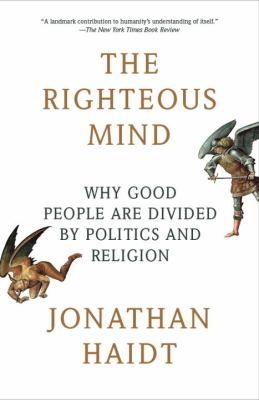wrul (pre‐2023) reviewed The Righteous Mind by Jonathan Haidt
parochial figure figures all parochial
1 star
It sounds a worthy idea, doesn’t it? In a volatile society, to draw on findings that promise to help ordinary people to coexist? If your idea of credible scientific methodology is for researchers to codify their own prejudices and then strive to promulgate and prove the resulting slapdash hypotheses through prematurely declared Theories and in unintentionally but laughably rigged experiments (rather than to test through attempts at disproving), the writing of Jonathan Haidt may be for you!!
Like Simon Baron‐Cohen is for him! “I do not want to suggest that utilitarianism and Kantian deontology are incorrect as moral theories just because they were founded by men who may have had Asperger’s syndrome,” writes Haidt, after invoking the spectre of Those Insensitive Autistics totally out of the blue for no other apparent reason, and while continuing to diligently lay out precisely the argument on which he claims not to want you …
It sounds a worthy idea, doesn’t it? In a volatile society, to draw on findings that promise to help ordinary people to coexist? If your idea of credible scientific methodology is for researchers to codify their own prejudices and then strive to promulgate and prove the resulting slapdash hypotheses through prematurely declared Theories and in unintentionally but laughably rigged experiments (rather than to test through attempts at disproving), the writing of Jonathan Haidt may be for you!!
Like Simon Baron‐Cohen is for him! “I do not want to suggest that utilitarianism and Kantian deontology are incorrect as moral theories just because they were founded by men who may have had Asperger’s syndrome,” writes Haidt, after invoking the spectre of Those Insensitive Autistics totally out of the blue for no other apparent reason, and while continuing to diligently lay out precisely the argument on which he claims not to want you to think he is relying (across pages 136–141, all‐inclusive). Presumably the key word was “just”, but it’s pulled tenuously thin by the masses of import that he makes it bear here.
Consistently full of a love to snap pathologise and shove aside whatever minds and whatever ethics to which Haidt personally has not come to relate, this book about humanity regularly betrays an intellectually fatal hypocrisy. Haidt is only at pains to insist that dedicated conservatism among voters (particularly within the United States of America) must not be considered misguided or malevolent. Policies of liberalism, he cautions, often undermine their own aims. Conservatives, he asserts, have a more sophisticated, complete grasp of human morality.
For instance, both ends of a left‐right spectrum dislike harm. We know this because chucking a tantie over not quite getting to possess everything you possibly can, is fundamentally equivalent to being upset about folks refusing necessities to anybody denied their society’s established survival tokens. This example also demonstrates that everybody values this other one same irreducible thing we all call fairness: the perniciously disadvantaged do not work nearly as hard as the hypercushioned, hence proportionate punishment and reward; every body is equal, hence uniform entitlement to all protections.
(Haidt may employ different phrasing, but the tenor of the logic remains. Does this parade of absurdity encourage people to take each other more seriously?)
But right‐wingers attend quantifiably more comprehensively to The conveniently prepackaged, shrinkwrapped foundations of morality — here’s some he prepared earlier! — which all things U.S.A. left neglect. By way of demonstration, we can presuppose what preachers of contrasting Christian denominations talk about (at page 188). Liberals wouldn’t be invoking concepts of sanctity more through words like “peace” than firey Baptists; they would just outright care less for the sacred.
It is immensely disheartening to read as over and over Haidt endorses dictionary‐definition rigidity, saucer‐shallow readings, and the misappropriation of mathematics to the most simplistic of measures in order to determine that an assumption aligns with itself. As though this supplants the work of genuine philosophical enquiry, literary analysis, theological examination, political study, or, heaven forbid, interview.
For most of its length, The righteous mind tries very hard to obfuscate its author’s political sympathies. Despite my criticisms, amicability and a kind of hopeful thoughtfulness do shine through Haidt’s words much of the time, but the caution can come off a touch manipulative. Haidt lowers his ineffectual guard in stages, where confident that reactive, partisan readers will have been pacified by his deliberate progression through dopey self‐help metaphors and naïve, self‐defeating anecdotes.
Finally, he pretends to legislative insight. Examples of where three partisan traditions ought to follow their opponents are given, along with a vague blessing of a Moral Science.
So take freely of such edicts as a libertarian moment (from pages 353 through 356), in which we (presumed Americans all, now) are asked to imagine a can of peas attracting a vertiginous price, after the fashion of basic medical needs in the U.S. Wouldn’t it be a preposterous burden, he steams, for “all of us [to be] paying” a 25% tax on income to cover a complete food insurance system! That getting even remotely adequate nutrition for such small portions of their money is currently impossible for many Americans does not, in this moment, occur to him. Indeed, he selectively forgets the notion of externalised costs and quite possibly has no clue whatsoever about, say, food deserts. That the wealth and ready thrift of those whose 25 percents constitute higher dollar figures has been subsidised by the actively imposed starvation of masses of unwaged, disenfranchised, and enslaved people across nonstop hundreds of years, just maybe affecting consumer and corporate expectations? No, no, the limited‐access cheap canned pea economy has all been effortlessly “arranged for [humanity’s] benefit”. Somehow he decides that the allegory of the grocery store has comprehensively destroyed the legitimacy of health insurance and not implicated the profit motive. “Success in the supermarket and insurance industries depend[ing] primarily on maximizing [businesses’ financial] yield” in a linear trajectory is cast as some kind of inevitable, innocent bystander, a byproduct very nearly implied to be specific to social security. Haidt redeclares Adam Smith’s invisible hand “miraculous”. By that standard, so’s poliomyelitis, but, look, me, personally, I don’t invite any old gobsmacking function to (a share in a platform of) ideological supremacy.
And to be fair, Haidt is doggedly against fundamentalism — at least as he interprets it. Unless that fundamentalism is rooted in the ultracompetitive killing field of evolutionary psychology.
Footnote to last para: Which is what it sounds like going off Haidt’s presentation of the contemporary literature.


